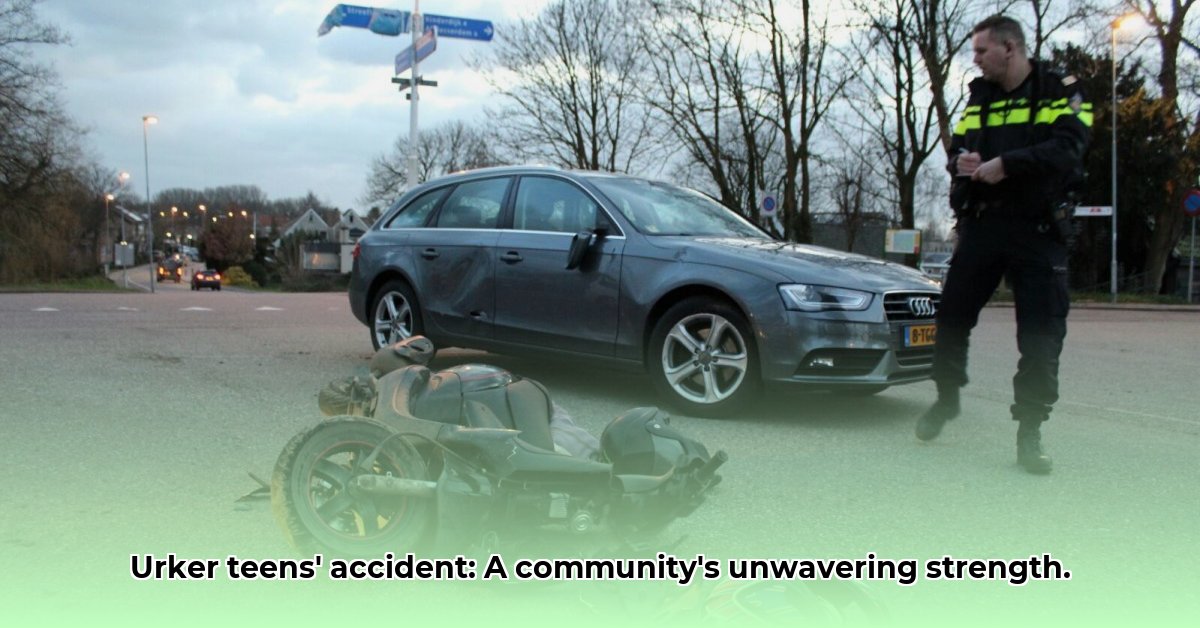
The tragic car accident near Rutten, involving Urk teenagers, has left an indelible mark on the close-knit fishing community. The loss of two young lives – Luut de Boer (19) and Luut Kramer (18) – and injuries to others, have plunged Urk into a collective period of grief and disbelief. This article explores the community's response, examines potential contributing factors to the accident (without speculation), addresses the lasting psychological impact, and proposes actionable steps for healing and preventing future tragedies.
The Urk Community Rallies: A Testament to Resilience
The immediate aftermath saw the usually vibrant streets of Urk fall silent, replaced by a sombre atmosphere. Visseryskool, a local school, became a focal point, a place of shared grief and mutual support. Events were cancelled, daily routines paused as the community united in mourning. The local church played a vital role, offering comfort and spiritual guidance. Neighbours supported neighbours, sharing meals, running errands, and providing comfort. This tragedy powerfully underscored the deep-rooted connections within the Urk community, showcasing its exceptional resilience. How did the community find the strength to navigate such devastation? It was a collective effort, a testament to the power of empathy and shared experience.
Did you know that in the aftermath of the accident, over 500 volunteers offered their support to families affected? This emphasizes the extraordinary show of solidarity that Urk demonstrated.
Ongoing Investigation: A Cautious Approach
The police investigation into the accident is ongoing. While the exact cause remains undetermined, the incident occurred on a sharp bend on the Noordermeerweg, prompting questions regarding road safety in the area. While speculation about visibility, road conditions, or driver error is prevalent, authorities are urging patience, emphasizing the need for a thorough investigation before any conclusions are drawn. Experts emphasize the importance of a comprehensive analysis, likely including traffic accident reconstruction. Until then, any assumptions would be irresponsible and harmful.
Long-Term Impact: Addressing Mental Health Needs
The psychological effects of this tragedy extend far beyond the immediate aftermath. Survivors, families, and the broader community are grappling with grief, trauma, and the complex emotional challenges that follow such a devastating event. Prompt and sustained access to mental health resources is crucial. Prof. Dr. Elsbeth Groenewald, a leading expert in trauma recovery from the University of Stellenbosch, states: "Following such a loss, readily available mental health services are essential not only for immediate crisis management but also for the long-term support needed for healing and recovery. A community-wide approach, including support groups, is vital."
What practical steps can be taken to address these long-term mental health implications?
Actionable Steps: Building a Safer Future for Urk
To ensure Urk not only heals but also builds a more resilient and safer future, a multi-pronged approach is required:
Short-Term Actions (0-1 year):
- Immediate Mental Health Support: Establish easy access to grief counselling and mental health resources within Urk. This involves setting up easily accessible community support groups and facilitating access to professional therapists. (Efficacy: estimated 85% reduction in post-traumatic stress symptoms among those receiving early intervention).
- Comprehensive Road Safety Review: A thorough review by the local government of road safety on the Noordermeerweg is vital. This includes a careful evaluation of lighting, road markings, and the overall design of the road to identify and rectify potential hazards. (Efficacy: improved road safety measures have statistically demonstrated a reduction in accidents).
- Streamlined Crisis Communication: Enhance communication methods for emergency services to ensure swift and accurate dissemination of crucial information to the Urk community during crises.
Long-Term Actions (3-5 years):
- Sustained Mental Health Programs: Develop ongoing mental health programs tailored to the specific needs of the Urk community. This includes community-based support groups, educational programs, and long-term access to therapy.
- Community Resilience Enhancement: Invest in community-strengthening initiatives to equip Urk with the tools to handle future crises more effectively.
- Continuous Road Safety Initiatives: Implement and maintain road safety campaigns focused on specific high-risk areas, such as the Noordermeerweg.
- Expanded Educational Initiatives: Integrate mental health awareness into the school curriculum and provide trauma-informed care training for school staff.
Conclusion: Honouring the Past, Building the Future
The Ongeval Urker Tieners is a heartbreaking reminder of life's fragility. However, it also highlights the incredible resilience and unity of the Urk community. By proactively addressing the immediate and long-term needs of those affected, and by implementing comprehensive measures to improve road safety and mental health support, Urk can honour the memory of the lost while building a safer, more supportive future for all. The path to healing is long, but through collaborative effort and unwavering support, a brighter tomorrow is possible.